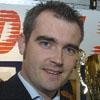
DAVID Flitcroft has praised the reactions of Town’s medical staff after revealing the first-half substitution of striker Harry Smith during Saturday’s 2-2 draw with Chesterfield was entirely out of his hands.
Smith was involved in a collision with Spireites’ defender Sam Hird just before the half hour at the Energy Check County Ground and, after an on-pitch concussion assessment, was escorted from the field with a huge lump on the side of his head.
Hird continued on to half-time before being replaced, a move Chesterfield boss Jack Lester said afterwards was made at the behest of Town’s medical representatives.
“There was nothing wrong with him (Hird) but their club official subbed him off,’’ said Lester. “Our physio said he was fine and their club physio got involved and he had to come off, which is not ideal when subs being made are not our decisions.’’
Flitcroft meanwhile was entirely comfortable with the medical response to Smith’s plight, pointing out that the Football Association’s own guidelines on head injuries removed him from the decision-making process.
“It’s as big a lump as you’ll see from an impact injury and the medical staff were fantastic,” said the Town boss.
“At that point you have to get them off the pitch. I’m not responsible in that situation. The medical staff are qualified and there is no way with a concussion that he can play on.
“That safety and that well-being of a player is miles more important than any three points, or any win. Harry came off the pitch and it’s the right decision.
“The regulations come from the world of rugby now. If there is any doubt and any suspicion that a player is concussed.
“As a club it’s responsibility to have a duty of care to a player and that’s what we’ve done.”
Under the FA’s guidelines Smith is likely to undergo a minimum six-step staged return to action after Saturday’s blow if concussion is confirmed.
The regulations state that if there is any suspicion of concussion, the player must be removed from the field and not allowed to return. A minimum of 24 hours of ‘physical and mental rest’ are required, followed by regular assessments and the gradual build-up of exercise, training drills and full contact practice for at least six days before return to play is allowed.



Comments: Our rules
We want our comments to be a lively and valuable part of our community - a place where readers can debate and engage with the most important local issues. The ability to comment on our stories is a privilege, not a right, however, and that privilege may be withdrawn if it is abused or misused.
Please report any comments that break our rules.
Read the rules hereLast Updated:
Report this comment Cancel